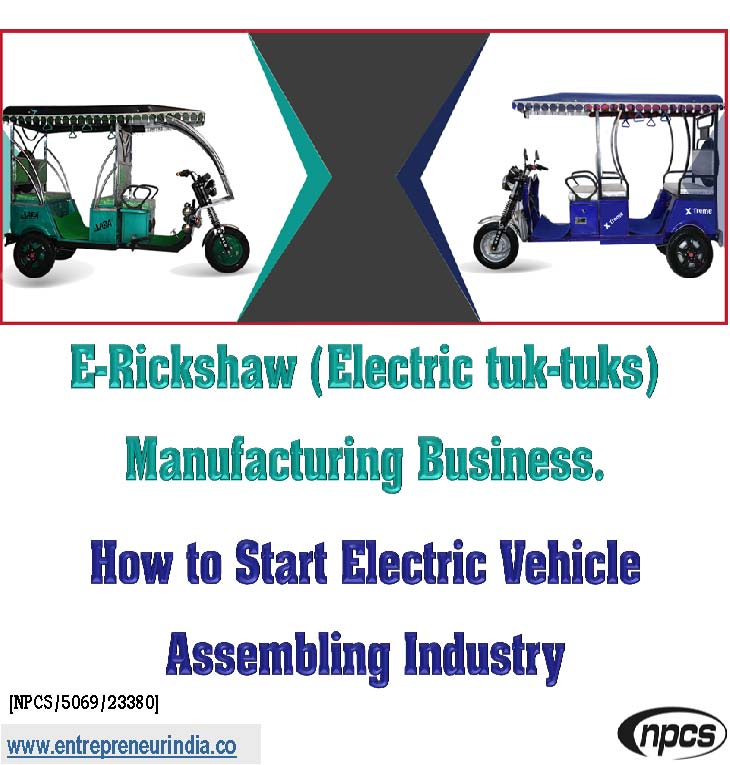
The E-Rickshaw manufacturing business has emerged as a lucrative and sustainable venture in India’s evolving transportation landscape. As the government and consumers alike push for eco-friendly mobility solutions, electric rickshaws have become a preferred mode of transport in urban and semi-urban areas. Affordable, efficient, and emission-free, e-rickshaws are transforming last-mile connectivity while creating thousands of micro-entrepreneurial opportunities.
Surge in Demand for Electric Mobility Solutions
India’s rising focus on electric vehicles (EVs), coupled with fuel price volatility and pollution control efforts, has significantly increased the demand for E-Rickshaws. These battery-powered three-wheelers provide an economical and clean alternative to traditional auto-rickshaws, especially for short-distance transport. Major state governments have also initiated subsidy programs and eased policies to promote the manufacturing and adoption of e-rickshaws.
What is an E-Rickshaw?
An e-rickshaw is a battery-operated three-wheeler designed for passenger or goods transport. It typically runs on a 48V or 60V lead-acid or lithium-ion battery and offers a range of 80 to 120 kilometers per charge. Lightweight, silent, and cost-effective, e-rickshaws require minimal maintenance and are easy to operate, making them ideal for small-scale drivers and fleet owners.
Types of E-Rickshaws in the Market
The e-rickshaw industry caters to diverse consumer needs. Major types include:
-
Passenger E-Rickshaws – 4+1 seating, mostly used for city rides
-
Loader E-Rickshaws – For transporting goods, with a payload of 300–500 kg
-
Customized Rickshaws – Designed for vending, cargo, delivery services, or school transport
-
Solar-powered E-Rickshaws – Integrated with rooftop solar panels for auxiliary charging
Manufacturers can choose to specialize or offer a range of variants under a single brand.
Raw Materials and Components Required
To set up an e-rickshaw manufacturing unit, the following components are needed:
-
Mild Steel Chassis and Frame
-
Electric Motor (850W to 1500W)
-
Controller Unit and Throttle System
-
Lead-Acid or Lithium-Ion Battery Pack
-
Tyres and Alloy Wheels
-
Suspension and Shock Absorbers
-
Axles, Brakes, and Wiring Harness
-
Roof, Windshield, Seats, and Cabin Accessories
-
Digital Meters, Lights, and Indicators
Most of these components are available from domestic suppliers, although some high-performance batteries and controllers are imported.
Manufacturing Process of E-Rickshaws
The e-rickshaw manufacturing process involves multiple assembly stages:
-
Chassis Fabrication
Mild steel pipes and sheets are cut, welded, and shaped to form the base frame. -
Motor and Suspension Installation
The electric motor, axles, brakes, and suspensions are mounted on the chassis. -
Battery and Electrical Assembly
Battery packs, wiring harness, lights, and digital systems are installed. -
Bodywork and Painting
Roof, windshield, seating, and doors are added, followed by paint and finishing. -
Quality Check and Test Drive
Each unit undergoes performance testing, load testing, and braking analysis. -
Branding and Packaging
Final assembly includes company branding, registration documentation, and logistics planning.
Manufacturing can be done in semi-automated units or manual assembly workshops depending on investment levels.
Plant Setup and Machinery Required
A basic e-rickshaw plant setup includes:
-
Welding and Fabrication Tools
-
Hydraulic Press and Pipe Bending Machines
-
Spray Paint Booth or Powder Coating Station
-
Battery Charging and Testing Station
-
Motor and Controller Testing Bench
-
Assembly Line with Trolleys and Jigs
-
Inspection Tools and Quality Testing Instruments
A plant area of 5,000 to 10,000 sq. ft. is sufficient for a unit manufacturing 200–500 rickshaws per month. The investment ranges from ?25 lakhs to ?2 crores depending on automation and scale.
Licensing and Compliance Requirements
To legally operate an e-rickshaw manufacturing business, the following registrations and certifications are essential:
-
Company Registration and GST Number
-
MSME/Udyam Registration
-
BIS Certification for Product Quality
-
Central Motor Vehicles Rule (CMVR) Compliance
-
Type Approval from ARAI/ICAT
-
Pollution Control NOC (for paint booth)
-
Insurance and Road Worthiness Certificates
Each model must pass approval tests for road safety, braking, lighting, and structural integrity.
Marketing and Distribution Strategy
E-rickshaws are sold through:
-
Dedicated Dealership Networks in cities and towns
-
Tie-ups with Microfinance Institutions for driver financing
-
B2B Sales to Aggregators and Fleet Operators
-
Direct Sales to Retail Buyers via Exhibitions and Online Platforms
-
Government Tenders for Public Transport Initiatives
Marketing strategies include social media campaigns, showroom demonstrations, EMI offers, and on-road test drives.
Profitability and ROI
The e-rickshaw manufacturing business offers excellent profit margins:
-
Production Cost per Unit: ?80,000 – ?1,25,000
-
Selling Price per Unit: ?1,40,000 – ?2,00,000
-
Gross Margin: ?30,000 – ?70,000 per vehicle
-
Break-even Period: 1.5 – 2 years for small units
Value-added services like after-sales support, spare parts, and extended warranties boost customer retention and revenue.
Sustainability and Future Outlook
E-rickshaws contribute significantly to sustainable mobility by:
-
Reducing CO? emissions in congested cities
-
Lowering dependence on imported fuel
-
Offering cost-effective transport for low-income commuters
-
Creating green jobs and empowering rural entrepreneurship
The future outlook remains strong with government incentives under FAME II, state EV policies, and rising battery innovations.
Conclusion
The E-Rickshaw manufacturing business is a future-ready opportunity aligned with India’s EV revolution. With rising demand, policy support, and market acceptability, it promises strong profits and long-term sustainability. Entrepreneurs who combine quality engineering with smart branding and robust distribution will find great success in this high-potential sector.
Niir Project Consultancy Services
An ISO 9001:2015 Company
106-E, Kamla Nagar, Opp. Spark Mall,
New Delhi-110007, India.
Email: npcs.ei@gmail.com , info@entrepreneurindia.co
Tel: +91-11-23843955, 23845654, 23845886, 8800733955
Mobile: +91-9811043595
Website: www.entrepreneurindia.co , www.niir.org





